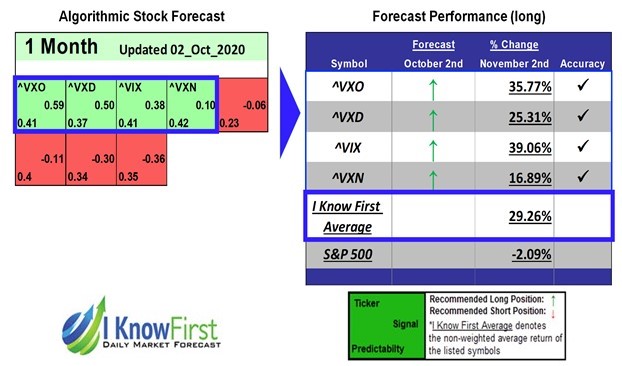Volatility Prediction Based on AI: Returns up to 39.06% in 1 Month
Volatility Prediction
This Volatility prediction is designed for investors and analysts who need predictions of the implied volatility for a basket of put and call options related to a specific index. It includes 8 volatility indices with bullish and bearish signals and indicates the best Volatility Index to trade:
- Volatility indices for the long position
- Volatility indices for the short position

Package Name: Volatility Forecast
Recommended Positions: Long
Forecast Length: 1 Month (10/2/2020 – 11/2/2020)
I Know First Average: 29.26%


I Know First’s State of the Art Algorithm accurately forecasted 4 out of 4 trades in this Volatility Forecast Package for the 1 Month time period. The highest trade return came from ^VIX, at 39.06%. ^VXO and ^VXD saw outstanding returns of 35.77% and 25.31%. The package itself saw an overall return of 29.26%, providing investors with a 31.35% premium above the S&P 500’s return of -2.09% for the same time period.
The Volatility Index, or VIX, is an index created by the Chicago Board Options Exchange (CBOE), which shows the market’s expectation of 30-day volatility. It is constructed using the implied volatilities on S&P 500 index options. This volatility is meant to be forward looking, is calculated from both calls and puts, and is a widely used measure of market risk.
Algorithmic traders utilize these daily forecasts by the I Know First market prediction system as a tool to enhance portfolio performance, verify their own analysis and act on market opportunities faster. This forecast was sent to current I Know First subscribers.
How to interpret this diagram
Algorithmic Stock Forecast: The table on the left is a stock forecast produced by I Know First’s algorithm. Each day, subscribers receive forecasts for six different time horizons. Note that the top 4 stocks in the 1-month forecast may be different than those in the 1-year forecast. In the included table, only the relevant stocks have been included. The boxes are arranged according to their respective signal and predictability values (see below for detailed definitions). A green box represents a positive forecast, suggesting a long position, while a red represents a negative forecast, suggesting a short position.
Please note-for trading decisions use the most recent forecast. Get today’s forecast and Top stock picks.











